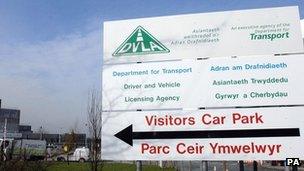Scottish independence: Ministers list bodies 'needing replication'
- Published

The DVLA is currently based in Swansea but serves the whole of the UK
The UK government has said more than 200 bodies currently serving people and businesses in Scotland may need to be replicated post independence.
It published the names of those organisations after a request from the Scottish government.
The bodies include UK government departments, the BBC and DVLA.
The Scottish government said the list showed a "cluttered" UK public sector and that many functions could be taken into existing Scottish organisations.
UK ministers said the list was evidence of the changes that would need to be made if people vote for Scottish independence in September next year.
They also said the 200 figure was a conservative estimate, given that organisations such as the Bank of England do not feature on the list due to the technical definition of what constitutes a public body.
Voters will be asked the single yes/no question in next year's referendum: "Should Scotland be an independent country?"
Ahead of the historic vote, the UK government has been publishing papers on how it believes independence will be bad for Scotland and for the rest of the UK.
So far, it has given its views on the legal framework of the UK; the currency and financial services.
The UK government said it was publishing the list to help "inform the debate ahead of the referendum".
It added the information should "assist the Scottish government in explaining whether and how it would replicate these bodies or expand existing ones to perform many of the critical functions they carry out, and what the likely costs would be".
'Clearly a challenge'
Scotland Office Minister David Mundell said: "This list clearly illustrates the range of ways in which the UK delivers for Scotland and all other parts of the UK.
"I am sure it will be an eye-opener for some just how large and complex a task it would be to replicate many of the services and bodies that we have working for us as part of the UK today.
"This list is a detailed reminder of the many changes in every walk of life that Scotland would have to deal with under independence. This is one of the many changes independence would bring and it is clearly a challenge for the Scottish government to outline what it would recreate and at what cost to the taxpayer."
A Scottish government spokeswoman said Scotland already had much of the infrastructure of an independent country.
She said: "We are already effectively independent in many policy areas such as health, education, police, law and order, environmental policy, rural affairs and local government - and bodies covering these key areas already exist in Scotland.
"The list published today by the UK government shows just how cluttered and inefficient the UK public sector landscape is. Devolved public bodies will shortly reduce to 113, representing a 43% decrease from a baseline of 199 in 2007.
"It would be wrong to suggest that Scotland would need to replicate many of the bodies on the list such as Public Health England, the British Library or the Wilton Park Conference Centre, and the functions of many other UK bodies could be integrated into existing Scottish bodies.
"And for some of the bodies named in this list, Scotland also already has its own equivalent national bodies, for example we have our own national sporting and tourism authorities."
The Scottish government said it intended to continue outlining the shape of an independent Scotland in papers being published in coming months.
Similar roles
A deal setting out terms to hold a Scottish independence referendum was signed by Prime Minister David Cameron and First Minister Alex Salmond in October last year.
The SNP government secured a mandate to hold the ballot after its landslide Scottish election win in May 2011.
The UK government, which has responsibility over constitutional issues, granted limited powers to the Scottish Parliament to hold a legal referendum, under a mechanism called Section 30.
The Scotland Office first mentioned the number of organisations it believed would need to be replicated after independence in its first analysis paper, Devolution and the implications of Scottish independence, external, which was published in February this year.
However, in that publication it did not list the bodies.
UK ministers said there were some UK bodies on the list that carried out similar roles to those operating in Scotland under devolution, including UK Trade and Investment and Scottish Development International.
It pointed out that such examples may not need to be re-created under independence, "but they may need to be expanded or changed in order to assume the full range of responsibilities that are currently reserved in the UK".
- Published21 June 2013